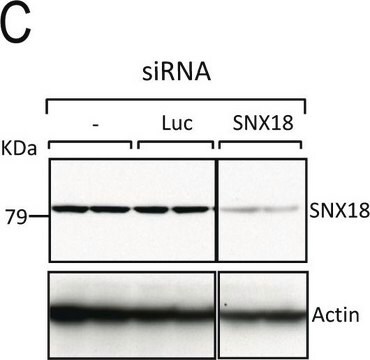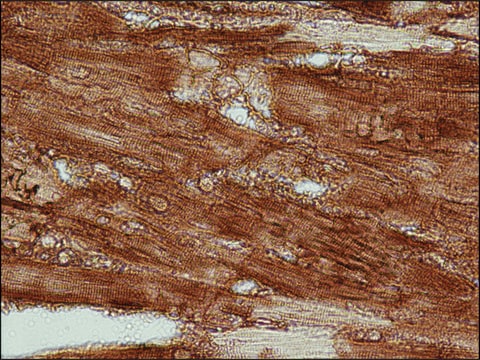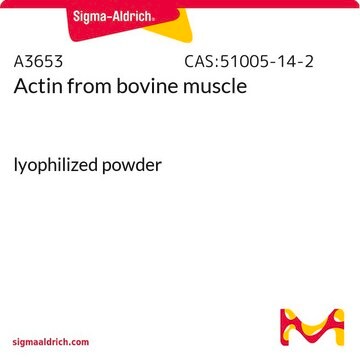A3853
Anti-Actin antibody, Mouse monoclonal
clone AC-40, purified from hybridoma cell culture
Sinónimos:
Monoclonal Anti-Actin antibody produced in mouse
About This Item
Productos recomendados
origen biológico
mouse
Nivel de calidad
conjugado
unconjugated
forma del anticuerpo
purified from hybridoma cell culture
tipo de anticuerpo
primary antibodies
clon
AC-40, monoclonal
formulario
buffered aqueous solution
envase
antibody small pack of 25 μL
técnicas
immunocytochemistry: 10-20 μg/mL using chicken or human fibroblasts by methanol/acetone fixation
immunohistochemistry: suitable
indirect ELISA: suitable
microarray: suitable
western blot: 0.5 μg/mL using chicken or human fibroblasts
Condiciones de envío
dry ice
temp. de almacenamiento
−20°C
modificación del objetivo postraduccional
unmodified
Categorías relacionadas
Descripción general
The antibody recognizes an epitope located on the C-terminal end of actin conserved in all actin isoforms. It specifically labels actin in a wide variety of tissues and species. The epitope recognized by the antibody is resistant to formalin-fixation and paraffin-embedding. Zinc-formalin, B5, ethanol, methacarn, Brunnel′s or Bouin′s solutions may also be used as fixatives.
Monoclonal Anti-Actin (mouse IgG2a isotype) is derived from the AC-40 hybridoma produced by the fusion of mouse myeloma cells and splenocytes from an immunized mouse. A synthetic actin C-terminal peptide, attached to Multiple Antigen Peptide (MAP) backbone was used as the immunogen. The isotype is determined using Mouse Monoclonal Antibody Isotyping Reagents, Catalog No. ISO2
Especificidad
Inmunógeno
Aplicación
Monoclonal Anti-Actin antibody produced in mouse has been used in the detection of actin in human bronchial epithelial cells using immunohistochemical assays. It has also been used in immunofluorescence detection in cardiomyocytes.
Acciones bioquímicas o fisiológicas
The actin in cells of various species and tissues are very similar in their immunological and physical properties characterized by electrophoresis and amino acid sequence analysis. They mediate cytoskeletal remodeling during T cell activation. Mutation in the γ-actin and β-actin gene is associated with a developmental disorder called Baraitser-Winter syndrome. Mutation in the γ-actin leads to hearing loss.
Forma física
Almacenamiento y estabilidad
Otras notas
Cláusula de descargo de responsabilidad
Not finding the right product?
Try our Herramienta de selección de productos.
Opcional
Código de clase de almacenamiento
10 - Combustible liquids
Clase de riesgo para el agua (WGK)
WGK 2
Punto de inflamabilidad (°F)
Not applicable
Punto de inflamabilidad (°C)
Not applicable
Equipo de protección personal
Eyeshields, Gloves, multi-purpose combination respirator cartridge (US)
Certificados de análisis (COA)
Busque Certificados de análisis (COA) introduciendo el número de lote del producto. Los números de lote se encuentran en la etiqueta del producto después de las palabras «Lot» o «Batch»
¿Ya tiene este producto?
Encuentre la documentación para los productos que ha comprado recientemente en la Biblioteca de documentos.
Los clientes también vieron
Nuestro equipo de científicos tiene experiencia en todas las áreas de investigación: Ciencias de la vida, Ciencia de los materiales, Síntesis química, Cromatografía, Analítica y muchas otras.
Póngase en contacto con el Servicio técnico
















